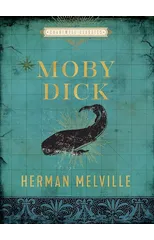Outwardly a compelling tale of events aboard a British man-of-war during the time of the Napoleonic Wars, "Billy Budd, Sailor" is a natural recasting of the Fall, a parable of good and evil, a meditation on justice and political governance, and a searching portrait of three extraordinary men. Also featured in this edition are eight shorter tales by Melville, reprinted from the most authoritative recent editions and supplemented by a penetrating Introduction and full notes.
Herman Melville
Herman Melville (1819-1891) was an American novelist, poet, and short story writer best known for his novel "Moby-Dick," a complex and symbolic work that explores themes of obsession, fate, and the struggle between good and evil. Melville's writing style is characterized by its rich symbolism, philosophical depth, and exploration of existential themes. His other notable works include "Typee," "Billy Budd," and "Bartleby, the Scrivener." Melville's contributions to literature have had a lasting impact on the development of American literature, particularly in the genre of the novel.




